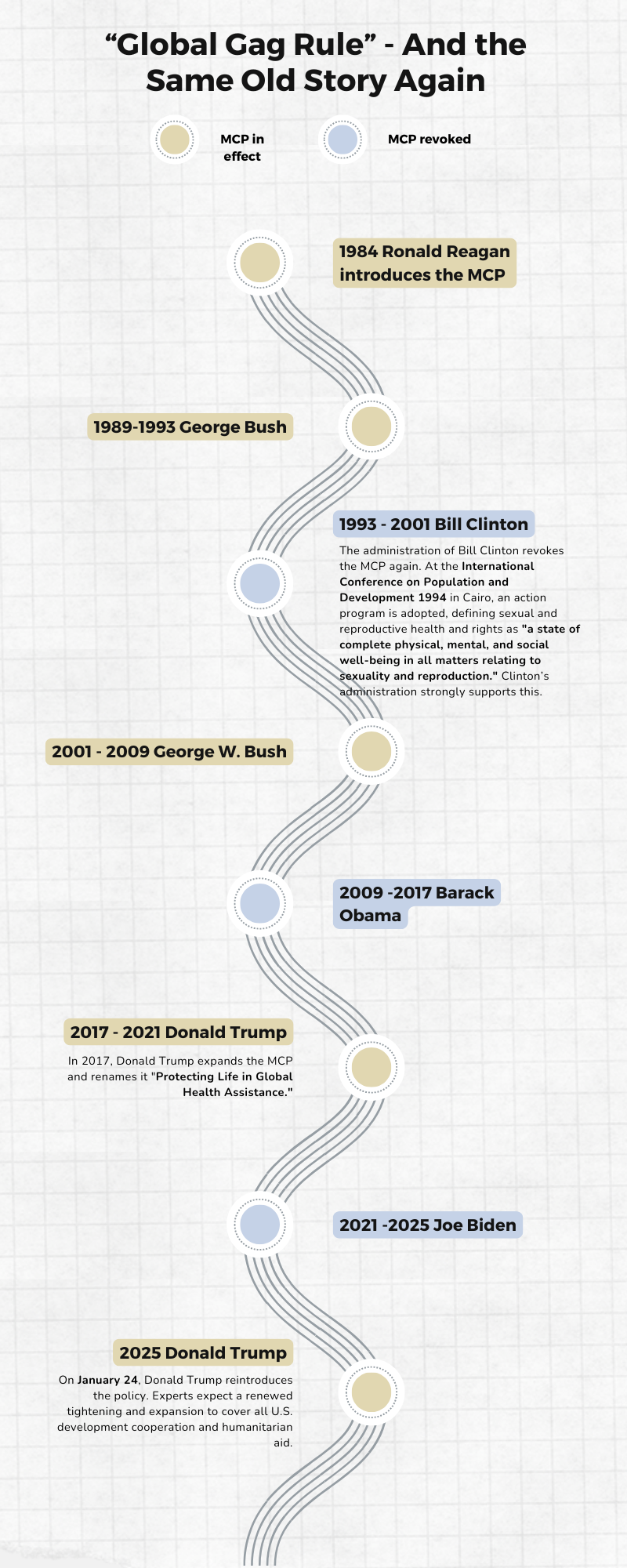Part 1 Global Health Under Pressure: How US Policy Affects Sexual and Reproductive Health and Rights

The new US administration has been in office for less than a month, and its impact on global health is already far-reaching. In our two-part article series, we examine how current US policy on global health affects sexual and reproductive health and rights (SRHR). Therefore, we have spoken with various experts from academia, politics, and international cooperation.
The new US administration has been in office for less than a month, and its impact on global health is already far-reaching. In our two-part article series, we examine how current US policy on global health affects sexual and reproductive health and rights (SRHR). Therefore, we have spoken with various experts from academia, politics, and international cooperation.
From withdrawing from the WHO to a 90-day funding freeze on US development cooperation, and the near-complete closure of the United States Agency for International Development (USAID), the shift in US foreign and development policy could hardly be more radical.
The WHO would lose its largest donor, creating a budget gap that would be difficult for others to fill. However, the consequences of withdrawal extend beyond this: the US healthcare system itself would also suffer negative effects. Without WHO membership, the country would lose access to critical information. This would be particularly devastating for pandemic preparedness and response. Additionally, the US government has instructed its Centers for Disease Control and Prevention (CDC) to cease all communication with the WHO. Following the US decision, Argentina also announced that it plans to leave the WHO.
The US is the world's largest donor in the health sector. In 2022, it invested approximately $15.8 billion, according to SEEK Development. This also applies to SRHR, where 65% of global funding in 2022 came from the US, as highlighted in the Deutsche Stiftung Weltbevölkerung (DSW) report "Donors Delivering for SRHR" (2024). In Tanzania, for example, the US is the largest bilateral donor in the field of family planning. Experts therefore believe that the Trump administration puts the reliable supply of family planning products, particularly in sub-Saharan Africa, at risk.
The new political stance is also being felt within the US. Just hours after Trump was sworn in as the 47th President of the United States, the government website reproductiverights.gov was no longer publicly accessible. Until then, citizens could find information on contraception, abortion, and reproductive health on this site.
On Friday, January 24, 2025, Trump also reinstated— as expected—the anti-abortion policy known as the "Mexico City Policy." He deliberately chose the 52nd anniversary of the Roe v. Wade decision by the US Supreme Court, which had established a nationwide right to abortion in 1973 but was overturned in 2022. The Mexico City Policy has devastating consequences for sexual and reproductive health and rights worldwide.
What is the Mexico City Policy?
In 1984, President Ronald Reagan first introduced the Mexico City Policy (MCP). He announced it at the World Population Conference, which took place in Mexico City in August 1984. Since its inception, the policy has made it more difficult for non-governmental organizations (NGOs) to advocate for safe abortion services. The rule stipulates that organizations receiving US family planning funding may not provide information or counseling on abortion—even if such services are funded from other sources.
Thus, the policy expanded existing laws that already prohibited US funding for abortion services internationally. Previously, however, organizations had at least been allowed to use alternative funding for such activities. The Mexico City Policy is therefore referred to by its critics as the "Global Gag Rule."
Since its introduction, Democratic presidents have consistently revoked the policy, only for Republican administrations to reinstate it. In 2017, President Donald J. Trump expanded the Mexico City Policy to apply to global health assistance funding and renamed it "Protecting Life in Global Health Assistance" (PLGHA). This affected programs in the areas of HIV/AIDS, maternal and child health, malaria, healthcare services, family planning, and reproductive health.

“Many young people cannot afford contraceptives. But everyone has the right to self-determined contraception and family planning,” says Candy Brandy Oyoo, who, alongside her teaching studies, volunteers for the Restoring Hope Foundation in Kenya and provides education for young people. The foundation relies on funding from the Global North, without which it could not run its programs. One of the organizations supporting the foundation is the DSW, which has been working in the field of sustainable population development and family planning for 30 years.
For this article, we spoke with Angela Bähr, a board member at DSW. She told us that while DSW is independent of US funding this year, this was not the case during Donald Trump’s last term. Back then, DSW Kenya had a partnership with Plan International for youth education, which was financed by USAID. The foundation decided not to sign the policy—a courageous but also risky decision, as it initially had to suspend its youth education projects.
However, DSW and its local partners were fortunate: Germany’s Federal Ministry for Economic Cooperation and Development (BMZ) stepped in during this exceptional situation and agreed to support a similar project by DSW Kenya. Together with bengo from Engagement Global, they developed the "Holistic Action for Young People in the Adolescence Phase" project. Through school education, youth training, and collaboration with journalists, the project implemented sexual education programs in schools.